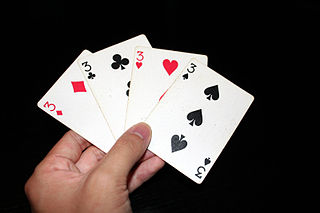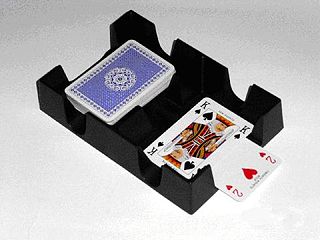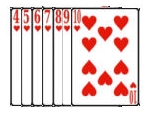Related Research Articles

Gin rummy, or simply gin, is a two-player card game variant of rummy. It has enjoyed widespread popularity as both a social and a gambling game, especially during the mid twentieth century, and remains today one of the most widely-played two-player card games.

Canasta is a card game of the rummy family of games believed to be a variant of 500 Rum. Although many variations exist for two, three, five or six players, it is most commonly played by four in two partnerships with two standard decks of cards. Players attempt to make melds of seven cards of the same rank and "go out" by playing all cards in their hands. It is "the most recent card game to have achieved worldwide status as a classic".

Robbers' rummy is a card game for two or more players. It is a variant of German Rummy dating to the early 20th century. Being derived from normal rummy, it emphasises arrangement of cards based on card matching rules, while abandoning the notions of card discards and scoring entirely.

500 rum, also called pinochle rummy, Michigan rummy, Persian rummy, rummy 500 or 500 rummy, is a popular variant of rummy. The game of canasta and several other games are believed to have developed from this popular form of rummy. The distinctive feature of 500 rum is that each player scores the value of the sets or cards they meld. It may be played by 2 to 8 players, but it is best for 3 to 5.

Rummy is a group of games related by the feature of matching cards of the same rank or sequence and same suit. The basic goal in any form of rummy is to build melds which can be either sets or runs and either be first to go out or to amass more points than the opposition.

Panguingue is a 19th-century gambling card game probably of Philippine origin similar to rummy, first described in America in 1905. It used to be particularly popular in Las Vegas and other casinos in the American southwest. Its popularity has been waning, and it is now only found in a handful of casinos in California, in house games and at online poker sites. In California, it, and the low-ball version of poker, were the only games for which it was legal to play for money.

Desmoche is a popular rummy card game usually played for small stakes which closely resembles other games in the rummy family, like Conquian and gin rummy, more than poker. It was probably devised in Nicaragua in the first half of the 20th century.

Liverpool rummy is a multi-player, multi-round card game similar to other variants of rummy that adds features like buying and going out. It is played the same as Contract rummy, except that if a player manages to cut the exact number of cards required to deal the hand and leave a face-up card, then the cutting player's score is reduced by 50 points.

Conquian, Coon Can or Colonel is a rummy-style card game. David Parlett describes it as an ancestor to all modern rummy games, and a kind of proto-gin rummy. Before the appearance of gin rummy, it was described as "an excellent game for two players, quite different from any other in its principles and requiring very close attention and a good memory to play it well".

Contract rummy is a Rummy card game, based on gin rummy played by 3 to 8 players. It appeared in the United States during the Second World War. The game is also known as Combination rummy, Deuces Wild Rummy and Joker rummy, and a proprietary version of the game called Phase 10 was published in 1982.

Dummy rummy is a variation of rummy for two to four players. It is played with two standard decks of cards, including four jokers, for a total of 108 cards. The jokers and twos are wild. It appears to be of American origin and may be copyrighted.

Rumino is a knock rummy card game of Italian origin for up to six people, in which players try to form sets or sequences of cards. It may possibly have been devised in America during the 1940s by Italian immigrants by adapting the game Scala Quaranta to Gin rummy. It is usually played for small stakes Two 52-card decks are used plus four Jokers comprising 108 cards.
Three thirteen is a variation of the card game Rummy. It is an eleven-round game played with two or more players. It requires two decks of cards with the jokers removed. Like other Rummy games, once the hands are dealt, the remainder of the cards are placed face down on the table. The top card from the deck is flipped face up and put beside the deck to start the discard pile.

Continental Rummy is a progressive partnership Rummy card game related to Rumino. It is considered the forerunner of the whole family of rummy games using two packs of cards as one. Its name derives from the fact that it is played throughout the continental Europe, the United States, Mexico, Canada, and also in South America. According to Albert Morehead, it was "at one time the most popular form of Rummy in women's afternoon games, until in 1950 it lost out to Canasta."
Indian Cherokee Rummy is a card game in India with little variation from original rummy. It may be considered a cross between Rummy 500 and gin rummy. Indian Rummy is a variant of the rummy game popular in India that involves making valid sets out of 13 cards that are distributed among every player on the table. Each player is dealt 13 cards initially; if the number of players is 2, then a 52 cards deck is chosen for the game and if there are 6 players, two decks of 52 cards each is combined for the game. Each player has to draw and discard cards by turns till one player melds their cards with valid sets that meet the Rummy validation rules. It could be that Indian Rummy evolved from a version of Rummy in South Asia, Celebes Rummy, also called Rhuk.

Kalooki or Kaluki is a card game popularly played in Jamaica,. It is sometimes called Jamaican Rummy for similarities in structure the game bears with Contract Rummy or Gin Rummy. The games are, however, different and not to be confused.

Marriage is a Rummy card game widely played in India. It uses three or more packs of playing cards.
Tong-its is a three-player rummy card game popular in the Philippines.

The following is a glossary of terms used in card games. Besides the terms listed here, there are thousands of common and uncommon slang terms. Terms in this glossary should not be game-specific, but apply to a wide range of card games played with non-proprietary packs. It should not include terms solely related to casino or banking games. For glossaries that relate primarily to one game or family of similar games, see Game-specific glossaries.

German Rummy or Rommé is the most popular form of the worldwide game, Rummy, played in Austria and Germany. It is a game for 2 to 6 players and is played with two packs of French playing cards, each comprising 52 cards and 3 jokers. There are no partnerships. In Germany, the Germany Rummy Association is the umbrella organisation for local rummy clubs and organises national competitions. The game is often just known as Rommé in Germany and Rummy in Austria.
References
- ↑ "Tunk" in Roya, Will (2021). Card Night: Classic Games, Classic Decks, and the History Behind Them. Black Dog & Leventhal Publishers. p. 86. ISBN 9780762473519.
- ↑ Richard Delgado, Jean Stefancic Critical race theory: the cutting edge pg. 407 Temple University Press ISBN 1-56639-714-6
- ↑ John Scarne Scarne on Card Games: How to Play and Win at Poker, Pinochle, Blackjack, Gin and Other Popular Card Games pg. 108 Dover Publications (2004) ISBN 0-486-43603-9
- ↑ Heimer, Mel. Penniless Blues. New York, Putnam.
- ↑ "Rules of Card Games: Tonk". www.pagat.com. Retrieved 1 December 2021.
- ↑ "Glen Cook's Card Game - Tonk [Version HH-24]". bsfs.org. Retrieved 24 July 2020.